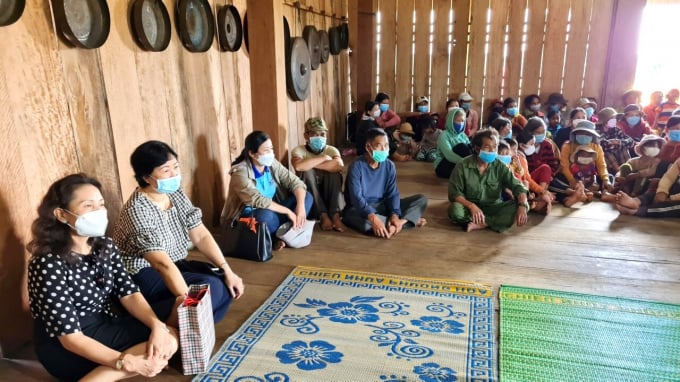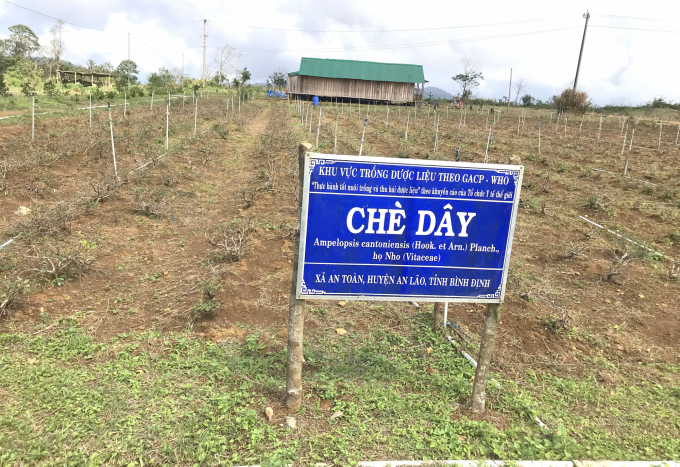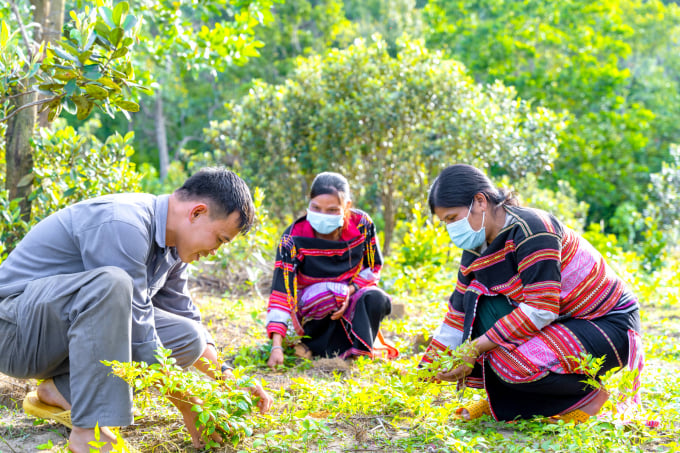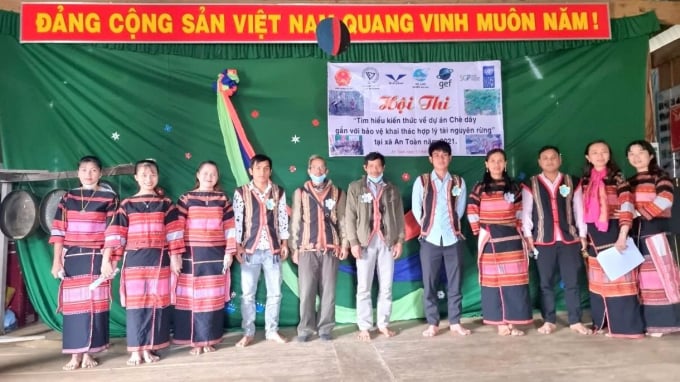May 23, 2025 | 18:37 GMT +7
May 23, 2025 | 18:37 GMT +7
Hotline: 0913.378.918
May 23, 2025 | 18:37 GMT +7
Hotline: 0913.378.918
Mr. Nguyen Duc Thiep, Specialist Pharmacist I, Head of Project Management Board, Clean Herbal Medicines Project, Binh Dinh Pharmaceutical and Medical Equipment Company (BIDIPHAR), shared that in October 2020, Global Environment Fund and BIDIPHAR cooperated with An Lao People's Committee and An Lao Women's Union to launch a project to transfer tea cultivation techniques to ethnic minorities.
The funding offered by GEF was USD 50,000. Binh Dinh province and An Lao district received a reciprocal budget of USD 25,000 to develop vine tea in An Toan.

An Lao Women's Union organizes dissemination activities and mobilizes Bana people in An Toan commune to participate in growing vine tea. Photo: V.D.T.
“The requirement of the Global Environment Fund is that the project must be assigned to local associations and organizations for better access towards the people. Upon receiving the project, An Lao Women's Union organized training sessions for women of An Toan commune to familiarize themselves with planting, caring for and developing vine tea tree through models deployed in 3 villages in the commune,” said Mr. Do Tung Lam, Vice Chairman of An Lao People's Committee.
Although the steps have been carefully prepared, there were problems upon implementation.
Before implementing the indigenous vine tea growing technique transfer, there was once a time when An Toan commune are full of energy amidst many projects on pineapple and passion fruit. The locals were also supported with seedlings, technical instructions and especially a commitment to sell products.
All seemed to be going so well. However, when the time to harvest come, no unit consumed the product as they initially committed. The people then tried their best to reclaim the capital and effort they put out by selling the fruits at a cheap price, but a satisfactory recovery was impossible to happen.
Nobody cared for those pineapple and passion fruit orchards anymore, and readily shook their head everytime they hear about a new project. The vine tea project was no exception.

BIDIPHAR’s vine tea growing area following GACP-WHO in An Toan commune (An Lao district, Binh Dinh). Photo: V.D.T.
“Faced with the above situation, in order to successfully implement the project, we had to break the ice layer of apprehension in the heart of the indigenous people. We started by disseminating how meaningful this project is. We talk with them, getting closer to them one step at a time. The Women's Union established affiliate groups and mobilized local reputable individuals to act as the core to build pilot models. The characteristic of ethnic minorities is that their trust cannot be earned by talks alone. They have to see it to believe it, they need successful pilot models to follow,” said Ms. Nguyen Thi Ai Dan, Chairwoman of An Lao Women's Union, Head of the Project Management Board.

Women in An Toan (An Lao district, Binh Dinh) grow string tea under the forest canopy. Photo: V.D.T.
After removing the problems in the hearts of the people, the project's team of experts encountered the next difficulty in transferring the vine tea growing and harvesting techniques in the direction of resource conservation to the people.
Mr. Ho Quang Thach, an officer of Binh Dinh Agricultural Extension Center, Head of the expert group, said that this project is implemented in groups of households with each village having 20 households divided into 2 groups.
Households participating in the project were provided with seeds, received training in techniques to grow vine tea under forest canopy and intensive farming techniques in upland areas. The locals were also instructed on how to collect wild vine tea growing naturally in the forest following the conservation process.

People in An Toan actively participated in a contest to learn about growing vine tea under the forest canopy in association with rational exploitation of forest resources. Photo: V.D.T.
Even so, the transferring process was nowhere easy. The majority of those from ethnic minorities cannot learn through training classes in a hall. The project team must guide them in the field in a hand-held manner. Experts had to take the seedling gourd, dig holes and put the seedling down to plant each specific move, then the locals imitated the process step by step.
"People here have this concept that 'a tree in the forest doesn't need anyone to take care of it but it still grows big and strong', so they just let the grass grow thick and cover the vine tea whole. How will it truly grow like that? If I want them to take care of this, I have to constantly go to each village to rile them up. And for every trip to encourage them, I have to go at night, since during the day children are the only ones in the house. All adults have already gone to work in the fields. And alcohol is something indispensable and of course I have to drink wine all night to ‘have a little chat’ with my fellows about the difference between naturally-grown vine tea and domestic-planted vine tea. The tea we ourselves grow needs caring. Talking to the people without drinking lacks spirit, so everytime I go to their house, I go all out with those wine jars," Mr. Ho Quang Thach gleefully said.
Translated by Samuel Pham

(VAN) The People's Committee of Tra Vinh province has approved an adjustment to the investment policy for the Green Hydrogen Plant project, increasing its area to approximately 52.76 hectares.
![Reducing emissions from rice fields: [2] Farmers’ commitment to the soil](https://t.ex-cdn.com/nongnghiepmoitruong.vn/608w/files/news/2025/05/05/dsc08881jpg-nongnghiep-140632.jpg)
(VAN) Clean rice cultivation model in Thuong Tan commune, Bac Tan Uyen district, is assisting local residents in achieving sustainable agriculture by substantially reducing costs, increasing productivity, and protecting the environment.

(VAN) At the conference to disseminate Resolution No. 68, AgriS introduced its digital agricultural ecosystem and reaffirmed its commitment to accompanying the Government in promoting private sector development and sustainable agriculture.

(VAN) 'Blue Ocean - Blue Foods' initiative is designed to restore marine ecosystems and establish sustainable livelihoods for local communities by cultivating a minimum of 1,000 hectares of cottonii seaweed in the first three years.
/2025/05/21/4642-3-112707_603.jpg)
(VAN) The V-SCOPE project has made direct contributions to three out of six pillars of the Comprehensive Strategic Partnership between Vietnam and Australia.

(VAN) Facing the threat of rabies spreading to the community, Gia Lai province urgently carries out measures to vaccinate dogs and cats on a large scale.

(VAN) Disease-free livestock farming not only protects livestock herds but also stabilizes production and livelihoods for many farmers in Tuyen Quang.